Book contents
- Frontmatter
- Contents
- Preface
- Acknowledgements
- Introduction: the contemporary reconfiguring of social theory
- Part I Resisting difference: the malaise of the human sciences
- Part II Engaging difference: from lesbian and gay studies to queer theory
- 6 Identity and politics in a “postmodern” gay culture
- 7 Deconstructing queer theory, or, some difficulties in a theory and politics of difference
- Part III Democratic prospects: the politics of knowledge and identity
- Epilogue: pragmatism, difference and a culture of strong democracy
- Notes
- References
- Index
6 - Identity and politics in a “postmodern” gay culture
from Part II - Engaging difference: from lesbian and gay studies to queer theory
Published online by Cambridge University Press: 05 October 2010
- Frontmatter
- Contents
- Preface
- Acknowledgements
- Introduction: the contemporary reconfiguring of social theory
- Part I Resisting difference: the malaise of the human sciences
- Part II Engaging difference: from lesbian and gay studies to queer theory
- 6 Identity and politics in a “postmodern” gay culture
- 7 Deconstructing queer theory, or, some difficulties in a theory and politics of difference
- Part III Democratic prospects: the politics of knowledge and identity
- Epilogue: pragmatism, difference and a culture of strong democracy
- Notes
- References
- Index
Summary
Contemporary lesbian and gay male cultures evidence a heightened sensitivity to issues of difference and the social formation of desire, sexuality, and identity. As individuals “we” know what it means to be treated as different, to be rendered as a deviant other by folk and expert cultures, and to approach our bodies, desires, and identities with a deliberateness often lacking in mainstream straight society. Nevertheless, this existential awareness of the cultural politics of otherness has not necessarily been reflected in our dominant theories. For example, the new sociology and history of same-sex intimacies has been narrowly focused on the social origin and development of lesbian and gay male identities and communities among almost exclusively white, middle-class Europeans or Americans.
The theoretical and political limits of the post-Stonewall culture have become apparent. Scholars seem to be rehearsing a monotone history of gay identity to the point of pointlessness. The arcane polemics between constructionists and essentialists has evolved into a sterile metatheoretical debate increasingly devoid of moral and political import. Much of current lesbian and gay studies remains wedded to a standard Enlightenment scientistic self-understanding that, in my view, is inconsistent with its social constructionist premises. Gay identity politics moves back and forth between a narrow single-interest-group politic and a view of coalition politics as the sum of separate identity communities, each locked into its own sexual, gender, class, or racial politic.
- Type
- Chapter
- Information
- Difference TroublesQueering Social Theory and Sexual Politics, pp. 109 - 138Publisher: Cambridge University PressPrint publication year: 1997
- 2
- Cited by

